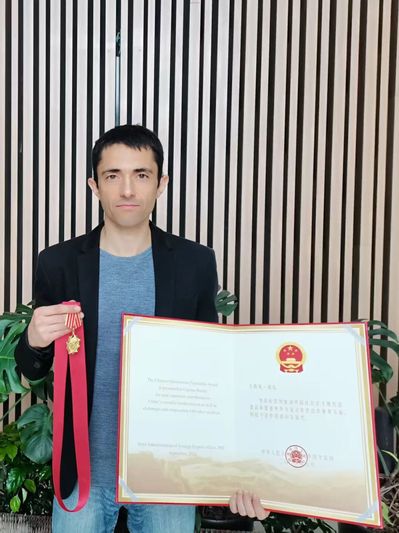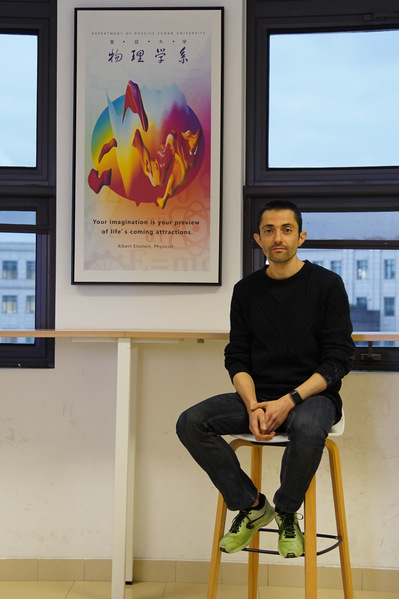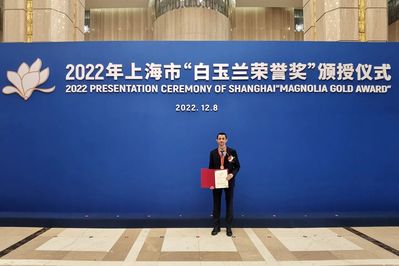On September 30, the award ceremony for the Chinese Government Friendship Award was held in the Great Hall of the People in Beijing. Cosimo Bambi, an Italian post-80s astrophysicist and the Xie Xide Distinguished Young Professor at Fudan University, was honored with the Chinese Government Friendship Award. The Chinese Government Friendship Award is the highest honor established to recognize foreign experts who have made outstanding contributions to China’s modernization drive. In the 2025 cohort, 50 foreign experts received this award. Over his 13 years in China, Bambi has evolved from a foreign “young academic” to a renowned expert, not only advancing the field of high-energy astrophysics in the country but also finding personal growth and a sense of belonging here.

Upon learning of his award, Bambi felt both honored and somewhat surprised. “Among the awardees, there are many senior scholars who came to China after already holding professorships in other countries and have contributed to China’s development. But my experience is a bit different; I grew up here in China.”
“Growth” was the most frequently used word when Bambi reflected on his feelings about the award. For him, receiving the Chinese Government Friendship Award is a form of recognition for his choice to build his career in China. In 2007, Bambi earned his PhD from the University of Ferrara in Italy under the supervision of world-renowned cosmology Professor Alexander Dolgov. He then conducted postdoctoral research at Wayne State University in the US, the University of Tokyo in Japan, and Ludwig Maximilian University of Munich in Germany. In 2012, after completing his postdoctoral work in Germany, he joined Fudan University as a full-time member of a national-level talent program and has worked there ever since.

During his time at the University of Tokyo, conversations with colleagues about China’s emphasis on scientific research sparked his interest in developing his career in the country. “I learned from my Chinese colleagues that China invests heavily in education and research, offering many opportunities for young people. Since Fudan is also one of China’s top universities, I thought, why not give it a try?” In his 13 years in China, Bambi has grown from a foreign “young academic” into an authoritative expert in high-energy astrophysics. He has received numerous honors, including the National Teaching Achievement Award, Shanghai’s “Magnolia Gold Award,” and the title of “Humboldt Scholar” from the University of Tübingen in Germany. He was also received by General Secretary Xi Jinping as a representative of foreign experts.
Where did the universe come from? And where is its future headed? “People always ask fundamental questions, so it’s easy to become interested in astrophysics.” Bambi has been curious about the vast starry sky since childhood, a curiosity that has consistently driven his exploration of the universe.

How to use X-ray techniques to probe the strong gravitational field environment around black holes in astrophysics is the core question of Bambi’s continuous exploration. According to Bambi, this research direction is expected to enter a “golden age” with the development of next-generation X-ray detection missions. At that time, high-precision observations will yield unprecedented, high-quality, massive amounts of data from black holes.
“Astrophysics is developing not just at Fudan, but across China, partly because the country has invested heavily in this field. To achieve this goal, you need people to work on both theory and observational data.” As an expert in the field, he leads his team in participating in the data analysis of observations from the black hole binary HXMT (Hard X-ray Modulation Telescope) and tests of general relativity, providing theoretical support for several major domestic and international projects.
At Fudan’s Department of Physics, which had long been known for its strength in condensed matter physics, Bambi’s arrival filled a gap in the field of high-energy astrophysics. He introduced the university’s first course in astrophysics and cosmology and published Introduction to Particle Cosmology, the only university-level textbook in particle cosmology in China. His book, Introduction to General Relativity, builds on the classic theory of general relativity by adding frontier topics like cosmological models and gravitational waves, further addressing the shortage of astrophysics textbooks in Chinese.
Known for being “highly productive,” he has published over 210 papers in high-impact-factor journals as the first or corresponding author, with more than 14,000 citations. He has also authored 13 academic monographs and one popular science book. Additionally, he serves as a reviewer for several international academic journals and book publishers and as a grant reviewer for multiple countries. “The research environment at Fudan is excellent and very conducive to doing research.”
In Bambi’s view, astrophysics is a field with great prospects, which is why it is attracting more and more young people. “Today’s technology is advanced enough that you can treat the entire universe as a laboratory. In the past, this was impossible because the technology simply couldn’t make precise measurements.”
At Fudan, Bambi established the university’s first research group in high-energy astrophysics and black holes, building it into a research team with international influence. Under his leadership, the team collaborates with world-leading institutions such as MIT, Caltech, and the University of Cambridge.
“My students are very international. Both international and Chinese students are very good at expressing their ideas in English.” In addition to Chinese students, Bambi’s students come from various countries like Germany, Colombia, and Pakistan. This diverse cultural background allows Chinese and international students to grow together through exchange and collaboration. “I am proud of them. They always work together with a strong team spirit.”
As a mentor, Bambi has his own educational “philosophy.” He is not a “strict teacher” in the traditional sense and dislikes rigid conformity. “Ultimately, students need to learn to find their own way to motivate themselves and then achieve results.” He said that compared to how students achieve these results, what is more important is their own choices and efforts.
In 2021, Bambi’s wish was granted when he obtained a Chinese permanent residence permit. “I really enjoy my life here.” This sense of belonging comes not only from his deep roots in academia but also from the joys he has discovered during his life in China.
Running is one of Bambi’s great passions in life. At Fudan’s Jiangwan Campus, you can often see him running. The fresh and open campus environment has become his favorite running route. He has participated in Fudan University’s “Fun Run” competition multiple times, winning the championship in the “10km Staff Men’s Group,” and his office is filled with medals from various running races. In recent years, he has also “unlocked” various sports facilities on campus, giving this fitness enthusiast, who works out daily, even more diverse options.

Regarding the future, Bambi hopes to continue delving into the field of astrophysics in China, “running” forward in pursuit of excellence, just as he does with his passion.
Source: Office of International Cooperation and Exchange, Department of Physics
Compiled by: University Integrated Media Center
Text: Wang Mengqi | Editor: Qiu Jiexin | Responsible Editor: Wang Mengqi
Original Title: “This Post-80s Foreign Professor at Fudan Received an Award at the Great Hall of the People”
